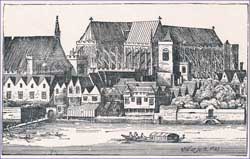 The first Presbytery of English Puritans was held at Wandsworth, on November 20, 1572, the same year as the Bartholomew massacre. The organizer of this first Presbytery, and the leader of early Presbyterianism in England, was the Rev. Thomas Cartwright, a professor of Divinity in Cambridge. In the appendix to Charles A. Brigg’s American Presbyterianism, there is provided a “Directory of Church Government” practiced by the first nonconformists [non-Anglicans] in the days of Queen Elizabeth, called “Cartwright’s Book of Discipline.” In due course of time Presbyterianism came to be quite powerfully organized in the vicinity of London, even in Elizabeth’s day, but it was rather as a church inside of the state church.
The first Presbytery of English Puritans was held at Wandsworth, on November 20, 1572, the same year as the Bartholomew massacre. The organizer of this first Presbytery, and the leader of early Presbyterianism in England, was the Rev. Thomas Cartwright, a professor of Divinity in Cambridge. In the appendix to Charles A. Brigg’s American Presbyterianism, there is provided a “Directory of Church Government” practiced by the first nonconformists [non-Anglicans] in the days of Queen Elizabeth, called “Cartwright’s Book of Discipline.” In due course of time Presbyterianism came to be quite powerfully organized in the vicinity of London, even in Elizabeth’s day, but it was rather as a church inside of the state church.
When Elizabeth died, James VI. of Scotland ascended the throne as James I. of England. His mother, Mary, Queen of Scots, had been thwarted by the Presbyterians of Scotland, and James himself had been in perpetual conflict with them. He came to the throne of England a natural despot, confident of his ability, intellectually and physically, to carry out his own will. He was a scholarly, skillful, profane, drunken fool. On the way from Edinburgh to London he received the Millenary Petition, asking relief for the Puritans, and held a conference, under his own presiding, between the friends of High Church Episcopacy and the representatives of free Protestantism. The High Church pretensions and flattery completely carried the day with his egotism; and the only outcome was his agreement to the suggestion of Edward Reynolds, of Oxford, spokesman in behalf of the Puritans, that there should be a new and better translation of the English Bible. That gave us King Jame’s Version.
In 1816 he published a book of sports “to encourage recreation and sports on the Lord’s day.” His theory was “no bishop, no king.” Throughout his reign, therefore, while resisting popery, he sought only to make himself pope of the Episcopal Church in England, and that Episcopal Church the only Church in the three kingdoms. He said that “presbytery agreeth with a monarchy as well as God with the devil.
Source:
Hay, George P., Presbyterians, pp. 46-48.
Also on this day in Presbyterian history:
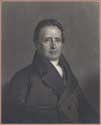 1774 — Birth of Jacob Jones Janeway, in the city of New York, the eldest child of George and Effie (Ten Eyck) Janeway. The year 1797 found the young man diligent in the use of the means of grace, and seeking growth in the divine life. “In reviewing my conduct, I felt that my sins were pardoned. In the morning exercise, on Monday, I was somewhat earnest in pleading with God. Towards the end of the week too much absorbed in study.” “This week my soul has been somewhat refreshed. I see that my heart is deceitful and easily ensnared by the world. Though we depart from God in our affections, yet if we strive to return he will accept and help us. Remember, O my soul, the exhortation, Work out your salvation with fear and trembling, for it is God that worketh in you, both to will and to do of his good pleasure. To this end I must be circumspect in my conduct, diligent and active.”
1774 — Birth of Jacob Jones Janeway, in the city of New York, the eldest child of George and Effie (Ten Eyck) Janeway. The year 1797 found the young man diligent in the use of the means of grace, and seeking growth in the divine life. “In reviewing my conduct, I felt that my sins were pardoned. In the morning exercise, on Monday, I was somewhat earnest in pleading with God. Towards the end of the week too much absorbed in study.” “This week my soul has been somewhat refreshed. I see that my heart is deceitful and easily ensnared by the world. Though we depart from God in our affections, yet if we strive to return he will accept and help us. Remember, O my soul, the exhortation, Work out your salvation with fear and trembling, for it is God that worketh in you, both to will and to do of his good pleasure. To this end I must be circumspect in my conduct, diligent and active.”
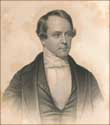 1849 — Inauguration of the Rev. James W. Alexander, D.D., as professor of ecclesiastical history and church government in the theological seminary at Princeton. Born near Gordonsville, Virginia, in 1804, the eldest son of Archibald Alexander, James was raised in a household filled with theological giants of the faith. His father was the president of Hampden-Sydney College at that time. But by the time that schooling had begun for James, his father had taken the pulpit of the Third Presbyterian Church in Philadelphia, Pennsylvania in 1807. Then in 1812, as the new seminary called Princeton began in New Jersey, the Alexander family moved there and Archibald Alexander became the first professor of that new divinity school. Young James graduated from the College of New Jersey in 1820. And while he studied theology at Princeton Seminary from 1822–1824, he would not be ordained by the historic Hanover Presbytery until 1827, having first served about three years as a tutor. He died on July 31, 1859.
1849 — Inauguration of the Rev. James W. Alexander, D.D., as professor of ecclesiastical history and church government in the theological seminary at Princeton. Born near Gordonsville, Virginia, in 1804, the eldest son of Archibald Alexander, James was raised in a household filled with theological giants of the faith. His father was the president of Hampden-Sydney College at that time. But by the time that schooling had begun for James, his father had taken the pulpit of the Third Presbyterian Church in Philadelphia, Pennsylvania in 1807. Then in 1812, as the new seminary called Princeton began in New Jersey, the Alexander family moved there and Archibald Alexander became the first professor of that new divinity school. Young James graduated from the College of New Jersey in 1820. And while he studied theology at Princeton Seminary from 1822–1824, he would not be ordained by the historic Hanover Presbytery until 1827, having first served about three years as a tutor. He died on July 31, 1859.
 1925 — The First Annual Conference of the League of Evangelical Students was held in Grand Rapids, Michigan, November 20-24, 1925. At this conference nineteen schools were represented, eleven theological seminaries and eight Bible schools, and these represented student bodies from Texas to Canada and from the Atlantic to the Pacific. The Conference, with its keynote on unswerving loyalty to the Bible as the only authoritative rule of faith and practice, was held on the campus of Calvin Theological Seminary and Dr. J. Gresham Machen spoke on the theme, “The Church’s Historic Fight against Modernism from Within.” An early 20th-century campus ministry, the League ran its course in a brief fifteen years, overtaken by the wider appeal of InterVarsity.
1925 — The First Annual Conference of the League of Evangelical Students was held in Grand Rapids, Michigan, November 20-24, 1925. At this conference nineteen schools were represented, eleven theological seminaries and eight Bible schools, and these represented student bodies from Texas to Canada and from the Atlantic to the Pacific. The Conference, with its keynote on unswerving loyalty to the Bible as the only authoritative rule of faith and practice, was held on the campus of Calvin Theological Seminary and Dr. J. Gresham Machen spoke on the theme, “The Church’s Historic Fight against Modernism from Within.” An early 20th-century campus ministry, the League ran its course in a brief fifteen years, overtaken by the wider appeal of InterVarsity.
 1936 — The Rev. Harold S. Laird, pastor of the First Independent Church, Wilmington, was elected president of the Independent Board for Presbyterian Foreign Missions [IBPFM], succeeding the Rev. Dr. J. Gresham Machen. Dr. Machen had also retired that same year as Moderator of the First General Assembly of the Presbyterian Church of America. The IBPFM had been organized in 1933 in response to the failure of the PCUSA to remove modernists from the foreign mission field. In reaction, the PCUSA’s General Assembly had, in 1934, issued a “Mandate” forbidding PCUSA ministers and laity from involvement with the IPBFM. Their refusal to step down from their participation with the IBPFM led to Machen and about a dozen others being defrocked or otherwise kicked out of the denomination.
1936 — The Rev. Harold S. Laird, pastor of the First Independent Church, Wilmington, was elected president of the Independent Board for Presbyterian Foreign Missions [IBPFM], succeeding the Rev. Dr. J. Gresham Machen. Dr. Machen had also retired that same year as Moderator of the First General Assembly of the Presbyterian Church of America. The IBPFM had been organized in 1933 in response to the failure of the PCUSA to remove modernists from the foreign mission field. In reaction, the PCUSA’s General Assembly had, in 1934, issued a “Mandate” forbidding PCUSA ministers and laity from involvement with the IPBFM. Their refusal to step down from their participation with the IBPFM led to Machen and about a dozen others being defrocked or otherwise kicked out of the denomination.
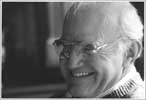 1952 — Addison Soltau was ordained on this day in 1952 and installed as pastor of the First Evangelical Presbyterian Church, Memphia, Tennessee. Born in Seoul, Korea, the son of missionary parents T. Stanley and Mary Cross (Campbell) Soltau, Addison came from a long and illustrious line of noteworthy Christians. He graduated from Wheaton College in 1949 and prepared for the ministry at Faith Theological Seminary, later earning a Th.M. degree from Calvin Seminary in 1966 and the Th.D. from Concordia Seminary in 1982. Leaving his pulpit in Tennessee, he labored as a missionary in Japan from 1953-1970, served as a professor at Reformed Bible College and at Covenant Theological Seminary, and has, since 1989, served on the pastoral staff of several churches in Florida. He is currently an associate pastor at the First Presbyterian Church of Coral Springs, in Margate, Florida.
1952 — Addison Soltau was ordained on this day in 1952 and installed as pastor of the First Evangelical Presbyterian Church, Memphia, Tennessee. Born in Seoul, Korea, the son of missionary parents T. Stanley and Mary Cross (Campbell) Soltau, Addison came from a long and illustrious line of noteworthy Christians. He graduated from Wheaton College in 1949 and prepared for the ministry at Faith Theological Seminary, later earning a Th.M. degree from Calvin Seminary in 1966 and the Th.D. from Concordia Seminary in 1982. Leaving his pulpit in Tennessee, he labored as a missionary in Japan from 1953-1970, served as a professor at Reformed Bible College and at Covenant Theological Seminary, and has, since 1989, served on the pastoral staff of several churches in Florida. He is currently an associate pastor at the First Presbyterian Church of Coral Springs, in Margate, Florida.
Words to Live By:
I suppose we could simply have stretched out the events of this twentieth day of November into the next six years with the six posts listed above, but it seemed good to explore some of the notable events and people for this date all at once. In that way, we behold the Lord’s providence of sovereignly governing both good and bad events on this day in Presbyterian history. James reminds us of the significance of one day when he asks and answers, “What is your life? For you are a mist that appears for a little time and then vanishes.” (James 1:14, ESV) To be sure, who among the people and events mentioned above ever wondered what else occurred on their day of November 20? That is why all of us need to take the words of James to heart when he wrote in verse 15, “Instead you ought to say, ‘If the Lord wills, we will live and do this or that.” (James 4:15 ESV) Use this last biblical thought as a prayer today as you read this post, and venture out into your world.
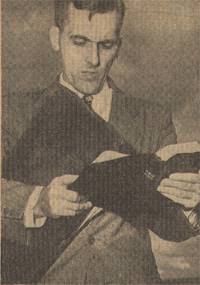 When the Lord took the Rev. Max Belz home to heaven on December 2, 1978, the Midwestern Presbytery of the Reformed Presbyterian Church, Evangelical Synod, lost one of its most colorful and most beloved members. He had been a member of this presbytery continuously since his entrance into the denomination in 1948 at the time when he led his congregation at Cono Center near Walker, Iowa, to throw off the shackles of the compromising fellowship of the Presbyterian Church in the USA.
When the Lord took the Rev. Max Belz home to heaven on December 2, 1978, the Midwestern Presbytery of the Reformed Presbyterian Church, Evangelical Synod, lost one of its most colorful and most beloved members. He had been a member of this presbytery continuously since his entrance into the denomination in 1948 at the time when he led his congregation at Cono Center near Walker, Iowa, to throw off the shackles of the compromising fellowship of the Presbyterian Church in the USA.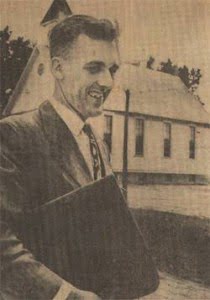 Max Belz was always deeply involved in the work of the church as a whole. He was a member of the founding board of Covenant College and Covenant Theological Seminary. He has also served on the board of Christian Training, Inc. It was through his initiative that the Bulletin News Supplement was begun, and for years he was responsible not only for its editing but also its printing-and he rejoiced in serving the church he loved so well.
Max Belz was always deeply involved in the work of the church as a whole. He was a member of the founding board of Covenant College and Covenant Theological Seminary. He has also served on the board of Christian Training, Inc. It was through his initiative that the Bulletin News Supplement was begun, and for years he was responsible not only for its editing but also its printing-and he rejoiced in serving the church he loved so well.








